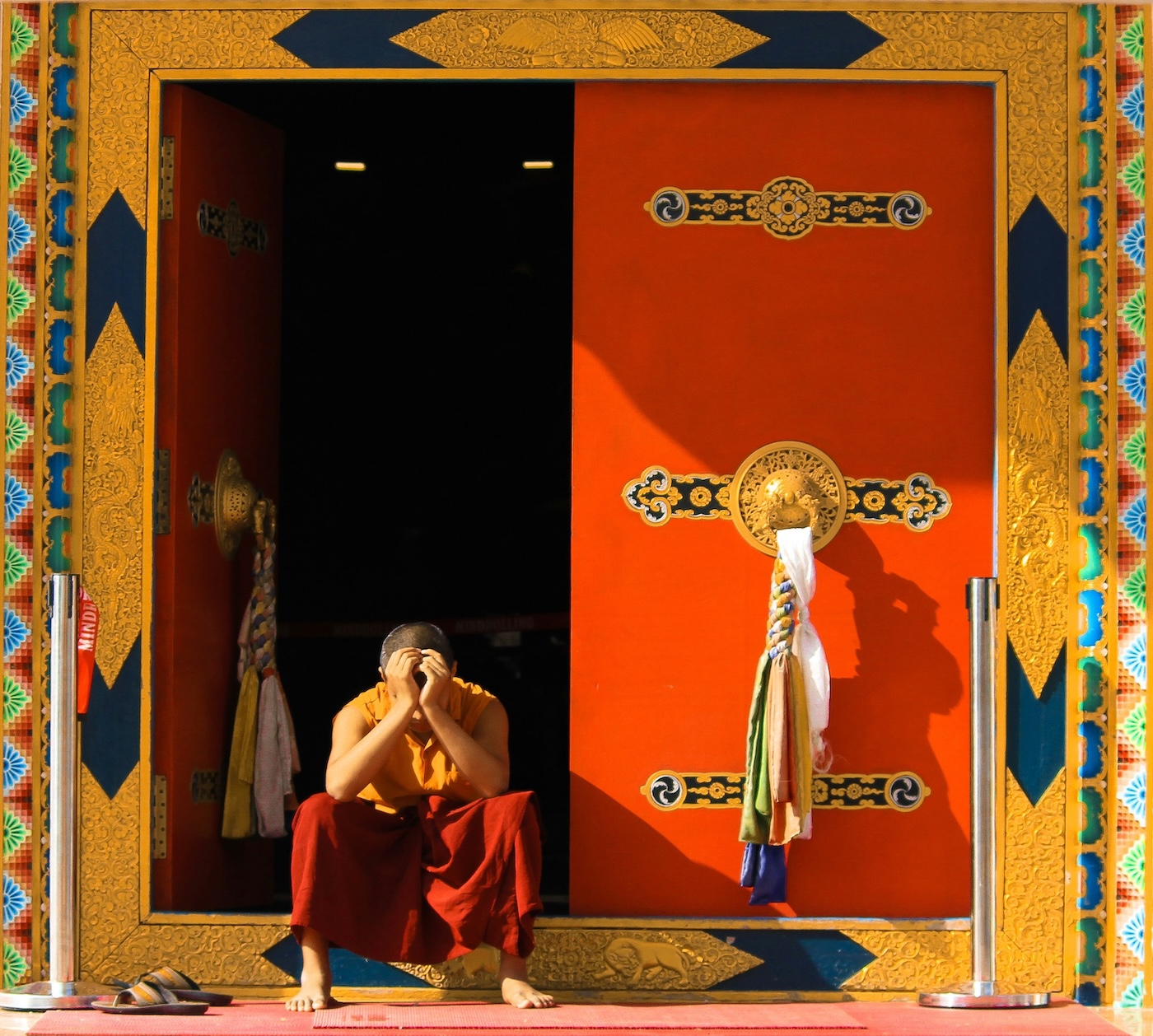Attached To This Life | ཚེ་འདིར་ཞེན་པའི་ཚོར་སྣང།
Reflections on the Eight Worldly Dharmas

Photo by Rohan Aggarwal on Unsplash
Preface
This poem was written during the teaching of Nyingtik Yabshi in May 2024. It is a reflection on attachment to the concerns of this life (ཚེ་འདི་), a fundamental obstacle on the Buddhist path.
In the Kadampa tradition, it is said that if one is attached to this life, one is not a true Dharma practitioner. This poem explores the various ways this attachment manifests—in our relationships with wealth, comfort, reputation, praise, and influence—and how these attachments become obstacles to genuine practice.
The poem follows a tetrameter structure in English and a traditional seven-syllable meter in Tibetan. The Tibetan version was revised with the assistance of my peers and teachers.
The English version
Praise to my Guru, Manjushri.
When around you I see my mind.
Attached to comfort and leisure,
A pig wallowing in its sty,
Blind towards the greatest treasure.
Even when having worldly wealth,
Hoarding it, nobody will see.
Miserly and with utmost stealth,
Even when beggars come to me.
I always want the finest things,
After acquired, yearning still.
Consuming whatever life brings,
Whether it’s food or cloth or thrill.
Worried and anxious to not lose
People, wealth, possessions and such.
How will they help when I’m loose
In the realm of unsated lust.
Leaving Dharma’s song on the side
I binge and talk about the world.
While lost in screens, my books I hide,
Neglecting my teacher’s pure word.
Bound to friends for validation,
In their company Dharma fades.
Idle talk brings good sensation,
Slowly turning from Truth’s embrace.
Reputation brings endless strain,
Consumed by others’ watchful gaze.
Dharma’s focus not being the main,
Carefulness has become mundane.
My interactions are crafty,
Creating social allure.
Just avoiding being haughty
So to keep my appearance pure.
Craving the thrill of the spotlight,
Being cherished by others’ eyes.
Virtuous only when in sight,
Consumed my mind is with this vice.
Seeking praise so sweet to my ear,
Amidst which Dharma’s song is lost.
Compliments that I hold so dear,
These mundane echoes I cling most.
Craving influence, having sway,
Unsought advice I freely give.
To control others, night and day,
On what they do and how they live.
Choosing respect over virtue,
And neglecting to serve beings.
Stepping out of any issue
That slightly disturbs my feelings.
Even when I practice Dharma,
I do so attached to this life.
Studying the Law of Karma,
I still engage in hurt and strife.
Even my conduct is mundane,
Despite knowing what fruit will come.
My meditation just the same,
When will my distractions be gone?
If you are attached to this life
You are not a practitioner.
Oh Guru, I hold your words tight,
Bless my mind to seek what’s better.
Me me me and myself and I,
Has been my mantra for all time.
Oh Guru, please compel my mind
To turn towards compassion’s chime.
Terrified of non-existence,
Confused whether I’m truly here.
Oh Guru, dispel the mist that
Obscures the Truth, please make it clear!
Bless me that I may dedicate
Whatever virtue I’ve accrued
For all wandering beings’ sake,
Just like Buddhas of three times do.
This tetrameter was written
During fourth lunar month’s eighth sun,
The year of the wooden dragon,
When Nyingtik Yabshi was given.
By an ignorant Spanish monk
Studying in Dzongsar Shedra.
བོད་ཡིག་གི་པར་གཞི།
བླ་མ་འཇམ་དཔལ་དབྱངས་ལ་བསྟོད། །
གང་ཚེ་ཁྱེད་ཉིད་མཇལ་བའི་ཚེ། །
སྔོན་བསགས་ལས་ངན་སྡིག་སྒྲིབ་རྣམས། །
ཡིད་ལ་ཡང་ཡང་འཁོར་བས་སྐྱོ། །
ཕག་པ་འདམ་དུ་འགྲེ་བ་བཞིན་། །
བདེ་བ་ལོངས་སྤྱོད་ཆགས་པ་ཡིས། །
སེམས་ཀྱི་རང་བཞིན་འོད་གསལ་བ། །
མིག་ལོང་བཞིན་དུ་མ་མཐོང་ངོ། །
ཨ་སྒོར་སྦས་ཏེ་གསོག་བྱེད་པའི། །
མི་རྣམས་ནོར་གྱིས་ཕྱུག་ན་ཡང། །
སེར་སྣ་བག་ཆགས་ངན་པ་ཡིས། །
ཉམ་ཐག་སློང་མོར་སྦྱིན་མ་ནུས། །
མི་དང་ནོར་རྫས་ལོངས་སྤྱོད་སོགས། །
ཤོར་ཡོང་སྙམ་པའི་སེམས་ཁྲལ་ཡོད། །
ཡི་དྭགས་གནས་སུ་སྐྱེས་འགྱུར་ན། །
དེ་དག་ཅི་ཡིས་ཕན་པར་འགྱུར། །
ཟས་གོས་དགའ་སྐྱིད་ཅི་ཡང་རུང་། །
གོ་སྐབས་ཐོབ་ཚད་སྤྱོད་པར་འདོད། །
རྟག་ཏུ་བཟང་ཤོས་ཐོབ་འགྱུར་ཀྱང་། །
ད་དུང་ཡིད་ཁ་ཚིམ་མ་འགྱུར། །
ཆོས་ཀྱི་གླུ་དབྱངས་ཕར་བཞག་ནས། །
འཇིག་རྟེན་གཏམ་ལ་མགོ་བོ་འཐོམ། །
དོན་མེད་བརྙན་འཕྲིན་ནང་ལྷུང་བས། །
བླ་མའི་གསུང་ཆོས་ཡ་མེད་གཏོང། །
བཅོས་པའི་སྒྲ་སྙན་ལ་ཆགས་པས། །
གྲོགས་པོའི་མདུན་དུ་བསྟོད་ལ་དགའ། །
དེ་དང་འགྲོགས་ན་ཆོས་ཉམས་འགྲོ། །
བདེན་པ་རིམ་གྱིས་བརྗེད་པར་འགྱུར། །
སྙན་གྲགས་རྗེས་སུ་འབྲང་བ་ཡིས། །
གཞན་གྱི་རྙི་རུ་ཚུད་པར་འགྱུར། །
ཆོས་ལ་གཙོ་བོར་མ་འཛིན་ན། །
ནམ་ཞིག་བག་ཡོད་ཉམས་པར་འགྱུར། །
ཁ་མཁས་སྤྱོད་པ་བྱེད་པ་ཡིས། །
སྤྱི་ཚོགས་ནང་དུ་གུས་ཐོབ་ཀྱང། །
ང་རྒྱལ་གོང་པོ་སྤོང་བྱེད་དེ། །
ཉམ་ཆུང་ངང་ལ་གནས་ན་མཛེས། །
ཀུན་གྱི་མིག་ཏུ་འགྱུར་པའི་ཕྱིར། །
རང་ཉིད་གཞན་ལས་ལྷག་པར་བྱེད། །
མཐོང་སར་དགེ་བ་བྱེད་ཙམ་གྱིས། །
སེམས་ཀྱི་ཉེས་པ་མི་བསལ་ལོ། །
བསྟོད་པ་སྙན་པོ་རྣ་བར་འདོད། །
དེ་ཡི་ཁྲོད་དུ་དམ་ཆོས་བརླག །
གཞན་གྱི་བསྟོད་བསྔགས་རྗེས་འགྲོ་བས། །
འཇིག་རྟེན་བྲན་དུ་གྱུར་པར་ངེས། །
གཞན་ལ་སྤྲོ་ཤུགས་སྤེལ་བའི་ཕྱིར། །
མ་བསྐུལ་བསླབ་བྱ་སྟེར་བར་བྱེད། །
གཞན་གྱི་སྤྱོད་པར་སྟངས་འཛིན་ཕྱིར། །
ཉིན་མཚན་ཀུན་ཏུ་འབད་པར་བྱེད། །
དགེ་བ་ལས་ཀྱང་ངོ་བསྟོད་བདམས། །
འགྲོ་ཕན་ངོ་མ་སྣང་མེད་བཏང། །
རང་དོན་སྒྲུབ་ལ་གནོད་འགྱུར་བའི། །
ལས་དོན་མ་ལུས་འདོར་བར་བྱེད། །
དམ་ཆོས་ཉམས་སུ་ལེན་དུས་ཀྱང་། །
ཚེ་འདིར་ཞེན་པས་བྱེད་པ་ཡིན། །
བསླུ་མེད་ལས་འབྲས་སློབ་གྱུར་ཀྱང། །
གནོད་འཚེ་རྩོད་པ་བྱེད་ལ་སྤྲོ། །
རྣམ་སྨིན་འབྲས་བུ་ངན་ན་ཡང། །
ད་དུང་སྤྱོད་པ་འཇིག་རྟེན་བཞིན། །
སྒོམ་པ་དེ་བཞིན་བྱེད་པས་ན། །
མི་དགེ་ནམ་ཞིག་ཟད་པར་འགྱུར། །
ཚེ་འདིར་ཞེན་ན་ཆོས་པ་མིན། །
དེས་ན་བླ་མའི་བཀའ་བཟུང་ངོ་། །
ཆོས་ལ་ཞུགས་པའི་བློ་སྦྱིན་ཅིག །
བླ་མས་རྗེས་སུ་བཟུང་དུ་གསོལ། །
རྟག་ཏུ་ང་ཞེས་འཛིན་ནས་ནི། །
ངག་ཏུ་སྔགས་སོགས་བགྲང་བ་ཡིན། །
བླ་མས་བདག་གི་སེམས་བསྐུལ་ནས། །
བྱམས་དང་སྙིང་རྗེ་སྐྱེ་བར་མཛོད། །
ཆད་ལྟར་ལྷུང་བར་འཇིགས་པ་དང་། །
རྟག་པར་ལྟ་བ་ཐེ་ཚོམ་གནས། །
གནས་ལུགས་སྒྲིབ་པའི་རྨོངས་སེམས་དེ། །
བླ་མས་བསལ་བར་མཛད་དུ་གསོལ། །
གུས་པས་རྩོམ་ཐུང་གང་བྲིས་པར། །
དགེ་བ་ཅུང་ཟད་མཆིས་འགྱུར་ན། །
དུས་གསུམ་སངས་རྒྱས་ཇི་བཞིན་དུ། །
འགྲོ་ཀུན་དོན་དུ་བསྔོ་བར་ཤོག །
Notes on Eight Worldly Dharmas
The poem reflects on the Eight Worldly Dharmas (འཇིག་རྟེན་ཆོས་བརྒྱད་) which are:
- Attachment to gain (རྙེད་པ་)
- Aversion to loss (མ་རྙེད་པ་)
- Attachment to pleasure (བདེ་བ་)
- Aversion to pain (མི་བདེ་བ་)
- Attachment to praise (སྙན་པ་)
- Aversion to blame (མི་སྙན་པ་)
- Attachment to fame (གྲགས་པ་)
- Aversion to disgrace (མ་གྲགས་པ་)
These eight concerns keep us bound to cyclic existence and prevent genuine renunciation. The Kadampa masters emphasized that any practice done while still attached to these worldly concerns is not true Dharma practice.